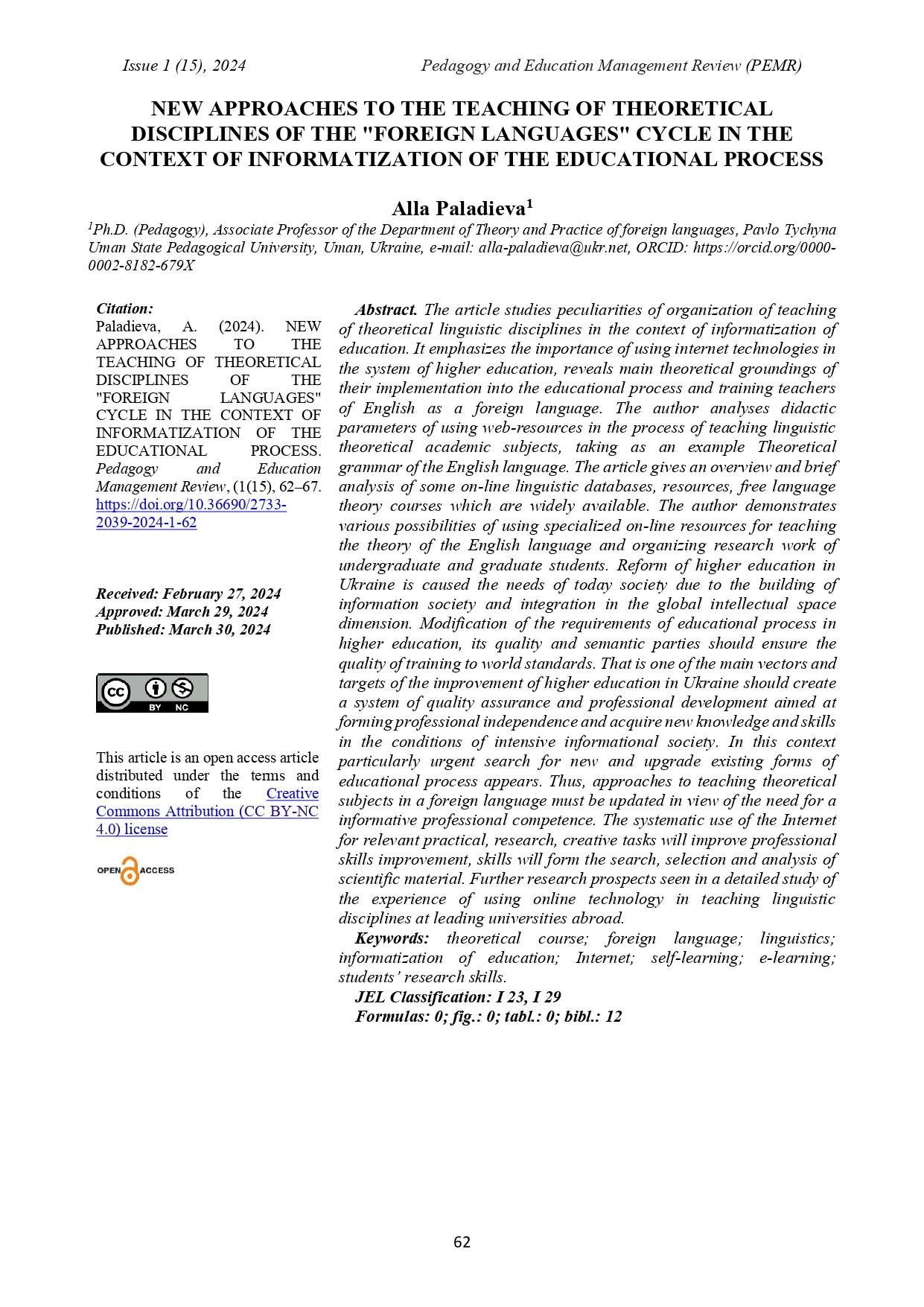NEW APPROACHES TO THE TEACHING OF THEORETICAL DISCIPLINES OF THE "FOREIGN LANGUAGES" CYCLE IN THE CONTEXT OF INFORMATIZATION OF THE EDUCATIONAL PROCESS
DOI:
https://doi.org/10.36690/2733-2039-2024-1-62Keywords:
theoretical course, foreign language, linguistics, informatization of education, Internet, self-learning, e-learning, students’ research skillsAbstract
The article studies peculiarities of organization of teaching of theoretical linguistic disciplines in the context of informatization of education. It emphasizes the importance of using internet technologies in the system of higher education, reveals main theoretical groundings of their implementation into the educational process and training teachers of English as a foreign language. The author analyses didactic parameters of using web-resources in the process of teaching linguistic theoretical academic subjects, taking as an example Theoretical grammar of the English language. The article gives an overview and brief analysis of some on-line linguistic databases, resources, free language theory courses which are widely available. The author demonstrates various possibilities of using specialized on-line resources for teaching the theory of the English language and organizing research work of undergraduate and graduate students. Reform of higher education in Ukraine is caused the needs of today society due to the building of information society and integration in the global intellectual space dimension. Modification of the requirements of educational process in higher education, its quality and semantic parties should ensure the quality of training to world standards. That is one of the main vectors and targets of the improvement of higher education in Ukraine should create a system of quality assurance and professional development aimed at forming professional independence and acquire new knowledge and skills in the conditions of intensive informational society. In this context particularly urgent search for new and upgrade existing forms of educational process appears. Thus, approaches to teaching theoretical subjects in a foreign language must be updated in view of the need for a informative professional competence. The systematic use of the Internet for relevant practical, research, creative tasks will improve professional skills improvement, skills will form the search, selection and analysis of scientific material. Further research prospects seen in a detailed study of the experience of using online technology in teaching linguistic disciplines at leading universities abroad.
Downloads
References
Alekseeva I.O. (2007). Course of theoretical grammar of the modern English language: study guide. Vinnytsia: Nova kniga. 328 p.
Kademiya M.Yu. & Shahina I.Yu.. (2011). Information and communication technologies in the educational process: a study guide. Vinnytsia: LLC “Planer”. 220 p.
Ortynsky V.L. (2009). Higher school pedagogy: teacher. manual [for students higher education acc.] K.: Center for Educational Literature. 472 p.
Morozova O.I. etc. (2010). Theoretical grammar of the modern English language: materials for the lecture course and tasks for independent work. Kh.: KhNU named after V.N. Karazin. 60 p.
Kharitonov I.K. (2009). Theoretical grammar of the modern English language: study guide. Vinnytsia: Nova kniga. 352 p.
Correa M. (2014). Teaching (Theoretical) Linguistics in the Second Language Classroom: Beyond Language Improvement. Porta Linguarum. Issue 22. pp. 161‒171. – URL: http://www.ugr.es/~portalin/articulos/PL_numero22/11%20%20MAITE%20CORREA.pdf
Kuchai, T., Honcharuk, V., Rokosovyk, N., Honcharuk, O., & Movchan, V. (2023). Theoretical problems of aesthetic education in institutions of higher education. Modern Information Technologies and Innovation Methodologies of Education in Professional Training Methodology Theory Experience Problems, 69, 134–141. DOI: https://doi.org/10.31652/2412-1142-2023-69-134-141
Kuchai, O., Honcharuk, V., & Dushechkina, N. (2023). The use of web technologies in the training of chemistry teachers. Modern Information Technologies and Innovation Methodologies of Education in Professional Training Methodology Theory Experience Problems, 67, 44–51. DOI: https://doi.org/10.31652/2412-1142-2023-67-44-51
Kuchai O. V., Andrusyk P. P., Rokosovyk N. V., Honcharuk V. V. (2023). Classification of web resources in the modern information society. Bulletin of the Glukhiv National Pedagogical University named after Oleksandr Dovzhenko. Scientific edition. Pedagogical sciences. 2 (52). P. 41–46. https://drive.google.com/file/d/14uIUdsoOGc072FB1iwPZBs_EoNE-Zl9v/view
Makogonchuk, N.V., Honcharuk, V.V., Kazak, Yu.Yu., Parakhnenko V.G. (2023). Professional development of a teacher's personality in the conditions of scientific and pedagogical education. Perspectives and innovations of science ("Pedagogy" Series, "Psychology" Series, "Medicine" Series): magazine. No. 10 (28), 2023. P. 286-299. URL: http://perspectives.pp.ua/index.php/pis/article/view/5157/5187
Kuchai Tetiana, Honcharuk Vitaly, Zorochkina Tetiana. Formation of readiness of the future specialist to use information technologies. Social work and social education. Uman State Pedagogical University named after Pavlo Tychyna. No. 2(11), (2023). P. 157-161. http://srso.udpu.edu.ua/
Kuchai T. Honcharuk V. Andrusyk P. METHODS OF USE WEB TECHNOLOGY IN THE PROCESS OF TRAINING OF STUDENTS OF HIGH SCHOOL. Proceedings. Series: Pedagogical sciences. Issue 5 / Ed. coll.: V.F. Cherkasov, O.A. Bida, N.I. Shetel and others. Uzhhorod-Kropyvnytskyi: "Code" Publishing House. (2023). P. 23-30.







